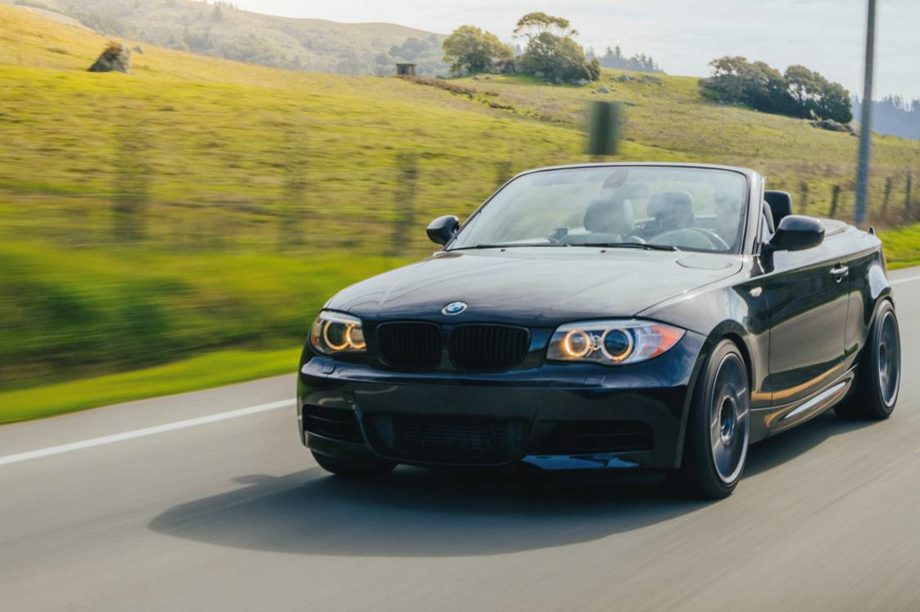
Cruising in a convertible car with the roof down in the summer months is a joy. Especially right now, with the excellent weather we’ve been having in the UK recently.
Feeling the wind through your hair, the warmth from the sun and getting a sense of freedom is one of the main reasons drivers buy a drop top car. However, driving or travelling in a convertible has the potential to damage your hearing when driving at certain speeds. Here’s what you need to know.
How loud is too loud?
The louder the sound, the more damage it can cause to your hearing, and the quicker damage will occur. Sound is measured in units called decibels (dB), and sounds below 85 decibels are considered safe. However, any sound above 85 decibels is highly likely to damage your hearing over time, especially if your ears are subjected to this level of noise for long periods.
To put this into context, research by Germany’s automobile associate, ADAC, showed that riding a motorcycle at 62mph typically generates a wind noise of 95dB, which can permanently damage hearing after 15 minutes. At 74mph, the wind noise can be expected to reach 98dB, which will prove harmful after just seven minutes of exposure. Without proper protection, this damage is irreversible, and could leave you with tinnitus (a permanent ringing in the ears) and diminished hearing ability.
Why can driving with the roof down be bad for my hearing?
When you travel with the roof of your convertible down, you and your passengers are far more exposed to the engine, wind, road and traffic noise than if the roof was up. These associated noises are of course amplified the faster you travel, and become more of a risk the longer you are exposed to them.
Research published in the journal Otolaryngology – Head and Neck Surgery showed that driving with the roof of the car and the windows down at 50, 60 and 70 miles per hour, the noise reached a maximum of 99 decibels, above the 85 decibel threshold at which permanent hearing damage becomes a serious risk.
However, the study also found that motorists can cut the damaging noise level by rolling up the windows when travelling with the top down. This simple measure cut the noise level to 82 decibels, but this is still extremely close the dangerous threshold, and different road and weather conditions may increase noise.
So, what other measures can you take to still enjoy the convertible car experience, without compromising the health of your hearing?
Hearing protection is key
To be completely sure that your hearing isn’t going to be damaged while travelling in a convertible with the roof down – either being the driver or a passenger – it’s important to wear hearing protection.
Our Auritech Biker ear plugs, which would also be ideal for a convertible car, are designed to be comfortable for long periods of time, and they have a unique design for optimum safety. Both our customisable moulded and universal fit ear plugs have a patented ceramic filter that is frequency selective, protecting you from harmful engine, road and wind noise.
As well as protecting your hearing, the selective filter also enables you to hear conversations clearly, perfect for when you have other people in the car, as well as other surrounding noises like car horns making them safe to wear when driving.
How does hearing damage occur?
The ear is made up of three main areas, the inner, middle and outer ear, with each section playing a part in processing sound. Sound waves are converted into electrical pulses that our brains can understand, allowing us to make sense of the sound that our ears pick up.
These sound waves pass into our ears and cause our eardrum to vibrate. Three small bones (known commonly as the hammer, anvil and stirrup, but medically called the malleus, incus and stapes) then amplify the vibrations before they travel into the inner ear, where the cochlea processes the waves into identifiable sounds.
It is in the cochlea where super sensitive hairs are found. Each hair is attached to a nerve cell and, as they die, the sound our brain hears becomes less clear. This happens naturally over time and as we get older, but can be accelerated by exposure to loud noise when not using hearing protection. Unlike some animals, humans can’t regrow these damaged hairs and, as a result, any damage is irreversible.
However, hearing damage due to loud noise is preventable. So, the best way to look after your hearing is by wearing protection while undertaking high noise exposure activities, including travelling in a convertible with the roof down.
Take a look the Auritech earplug range.